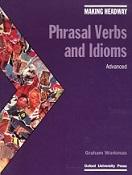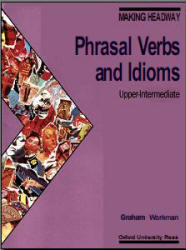Foreword.
Students of English realize very early on in their learning career that prepositions present a problem. They collocate with nouns, adjectives, past participles, and verbs, without rules or logic. Students simply have to learn that interested is followed by in, and good is followed by at, and go home has no preposition. Multi-word verbs, or phrasal verbs as they are often referred to, present a very special problem. English can make verb and particle (preposition or adverb) combinations easily and freely. The word particle has been used throughout this book, in order to avoid having to make the adverb/preposition distinction (to most students, the word after the verb in a multi-word verb is always a preposition). Multiword verbs exist throughout the language. They express everyday actions such as Turn on the light; they can also have a variety of meanings such as Things worked out well, We worked out the problem, She worked out in the gym, I've never been able to work him out, and The final price works out at £10.


